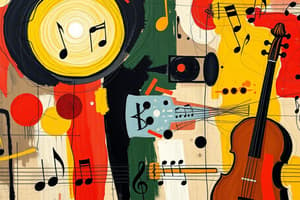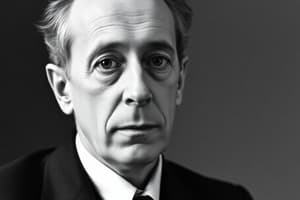Podcast
Questions and Answers
What is the term applied to an artistic style that depicts the expression of individual subjective experience?
What is the term applied to an artistic style that depicts the expression of individual subjective experience?
Expressionism
Which composer is known as a proponent of expressionism?
Which composer is known as a proponent of expressionism?
- Arnold Schoenberg (correct)
- Igor Stravinsky
- Bela Bartok
- George Gershwin
Match the following composers with their notable works:
Match the following composers with their notable works:
Arnold Schoenberg = Pierrot Lunaire Igor Stravinsky = The Rite of Spring Bela Bartok = Mikrokosmos George Gershwin = Rhapsody in Blue
The three major proponents of Impressionism are __________, __________, and __________.
The three major proponents of Impressionism are __________, __________, and __________.
Expressionism in music expresses the physical reality.
Expressionism in music expresses the physical reality.
What is the twelve-tone system?
What is the twelve-tone system?
Which of the following best describes Neo-Classicism?
Which of the following best describes Neo-Classicism?
Name two works composed by Igor Stravinsky.
Name two works composed by Igor Stravinsky.
What is the significant characteristic of Primitivism in music?
What is the significant characteristic of Primitivism in music?
The music of the 20th century comprises musical movements with distinctive styles. These are the __________, __________, __________, __________, and __________.
The music of the 20th century comprises musical movements with distinctive styles. These are the __________, __________, __________, __________, and __________.
Flashcards are hidden until you start studying
Study Notes
Expressionism
- Expressionism emphasizes individual subjective experience and emotional expression over objective reality.
- Atonality and the twelve-tone scale are key elements, revealing the composer's emotional state.
- Music features high dissonance, extreme dynamic contrasts, changing textures, and angular melodies.
- Arnold Schoenberg (1874–1951) is a primary figure in Expressionism, known for his twelve-tone system and works like "Verklarte Nacht."
Arnold Schoenberg
- Austrian composer born on September 13, 1874, in Vienna's working-class suburbs.
- Influenced by Richard Wagner; significant contributions include atonality and Sprechstimme.
- Created approximately 213 compositions, including orchestra and choral music.
- Notable works: "Pierrot Lunaire," "Three Pieces for Piano," "Gurre-Lieder," and "Verklarte Nacht."
Igor Stravinsky
- Russian composer born on June 17, 1882, known for his Neoclassical style and innovative compositions.
- Utilized traditional forms with modern techniques, featuring complex meters and offbeat rhythms.
- Major works: "Firebird," "Petrushka," "The Rite of Spring," "Symphony of Psalms," and operas like "The Rake's Progress."
Primitivism
- Primitivism focuses on simple musical ideas combined to create new sounds, emphasizing a singular tonal center.
- Links with Exoticism and Nationalism through cultural influences in music.
Neo-Classicism
- Characterized by light and entertaining music independent of emotional weight; relies on diatonic scales.
- Combines tonal harmonies with slight dissonance and utilizes varied rhythmic structures.
- Composers include Francis Poulenc, Igor Stravinsky, Paul Hindemith, and Sergei Prokofiev.
Sergei Prokofiev
- Born in Ukraine in 1891; innovated by blending Neoclassicism, Nationalism, and Avant-Garde styles.
- Prolific in symphonies, chamber music, and operas, including "Romeo and Juliet" and "War and Peace."
- Died on March 15, 1953, in Moscow.
Bela Bartok
- Hungarian composer born on March 25, 1881; integrated folk music into his unique style.
- Known for piano works, string quartets, and innovative use of changing meters and harmony.
- Major achievement: Six String Quartets, completed over 30 years.
- Died of leukemia on September 26, 1945.
Avant-Garde
- Represents a period of musical experimentation and critique of traditional forms.
- George Gershwin, a leading figure, blended jazz with classical music; notable works include "Rhapsody in Blue" and "Porgy and Bess."
- Leonard Bernstein was a prominent composer and conductor; known for "West Side Story" and educational television series.
Phillip Glass
- Avant-Garde composer recognized for minimalism; known for repetitive and evolving patterns.
- Influenced by Indian music and collaborated with Robert Wilson on operas such as "Einstein on the Beach."
- Composed around 170 works, merging different genres and styles.
Summary of Musical Movements
- Key movements of the 20th century include Impressionism, Expressionism, Primitivism, Neo-Classicism, and Avant-Garde.
- Each movement showcases distinctive styles and techniques that reflect the changing landscape of music during this era.
Studying That Suits You
Use AI to generate personalized quizzes and flashcards to suit your learning preferences.




